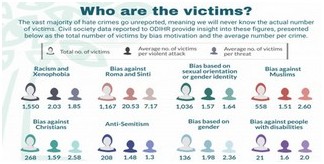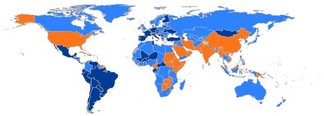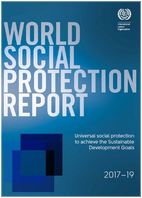Lack of Hate Crimes Recording Means Victims & Their Needs Often Remain Invisible – Gender +
Извор: WUNRN – 22.11.2020

WUNRN invites you to visit and engage with WUNRN Europe Twitter at: https://twitter.com/wunrn_eu
WARSAW, 16 November 2020 – With the publication of its annual Hate Crime Report on today’s International Day for Tolerance, the OSCE Office for Democratic Institutions and Human Rights (ODIHR) underscores the need for police to record hate crimes in order to ensure that victims are recognized and receive the support they so urgently need.
Behind every hate crime is a painful and often traumatic story of physical and psychological injury, fear and threat. Victims of hate crime are targeted for who they are and for characteristics intrinsic to their identity, and which they share with others. Recording such crimes and offering support to those affected is therefore key to ensuring the security of individual victims, their communities and society as a whole.
The data published today show that in many countries there are mechanisms in place to record and collect comprehensive data on hate crimes. However, a large number do not provide police and prosecutors with the tools and knowledge they need to recognize, record and effectively investigate such crimes. This frequently deprives hate crime victims of the opportunity to access much-needed specialist support.
ODIHR’s hate crime dataset is the largest of its kind worldwide, and gathers together information both from official and civil society sources. A total of 39 OSCE states reported official hate crime data to ODIHR for 2019, including 25 states that provided figures classified by bias motivation. The dataset includes a record number of 3,207 statistical and 3,757 descriptive hate crime incidents reported by civil society, which translates into a minimum of 4,621 hate crime victims.
No two hate crime victims are alike, which is why the support offered to victims must be tailored to their individual needs. These can include police protection, psychosocial support, practical assistance and information about criminal proceedings. Providing such support also empowers victims to play a meaningful role in the investigation and prosecution of hate crimes. Above all, they must receive respectful and sensitive treatment to prevent further psychological harm and to assist their long-term recovery.
ODIHR offers countries across the OSCE region a range of tools to help them support hate crime victims, improve hate crime monitoring and recording practices, and strengthen co-operation with civil society. The full range of ODIHR resources on countering hate crime is available on the website here.
Over the next three days, the findings of the 2019 dataset will be presented at an annual meeting of official representatives from across the OSCE region responsible for reporting hate crime data to ODIHR. Owing to the COVID-19 pandemic, the meeting will be held online for the first time



